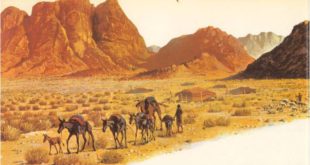Mohammed sometimes dictated his thoughts to his secretary, Zayd, but when he spoke in public no one wrote down what he said. Instead, his listeners learned his speeches by heart and mistakes crept in, as they usually do. Only a short time after Mohammed’s death people were repeating his sayings in quite different ways. If Mohammed had been anyone else, this would not really have mattered. It would have been enough to remember what he had said without bothering too much about how he had said it. But the Moslems believed that God himself had addressed them through Mohammed. Every word the prophet had spoken was therefore divine and even every pause between words. The more the different reports of his teachings multiplied, the more confused his followers became. THE KORAN Mohammed’s old companions soon realized that if this confusion Were allowed to go on, Islam could easily split up into quarreling groups. Eventually, either Abu Bakr or a later head of the movement, Othman, ordered Zayd to prepare a text of Mohammed’s teachings that would be correct and complete. Gathering written and remembered fragments of his master’s words “from the ribs of palm-leaves and tablets of white stone and from the hearts of men,” Zayd brought them all together in a book. This book afterwards came to be called the Koran, meaning “the reading aloud” in Arabic. To Moslems, its contents are the very word of Allah. Four-fifths the size of the New Testament, the Koran is made up of 114 suras, or chapters. These suras are not arranged in the order in which Mohammed first spoke them, but by length, beginning with the longest. Most of them, short and fiery, came to Mohammed during his early years of struggle in Mecca. They deal with such things as the …
Read More »The People of One God 3000 B. C. – 30 B. C.
On the plains of Mesopotamia, a young man stood gazing up at the stars that glittered from the dark sky of night. He was Abraham, a native of the Sumerian city of Ur. Abraham was a Hebrew, one of the many tribes of Semites said to have been descended from Shem, the son of Noah who had been saved from a great flood many years before. Like all people of his time, Abraham believed in many gods throughout nature. As he studied the pattern of the great stars for the god’s message, Abraham began to feel he was in the presence of a Lord God who was above all gods with idols and temples and sacrifices. Abraham felt, too, that this Lord God would take special care of those who lived up to his demands. Abraham became so devoted to this idea that years later he was inspired to leave Mesopotamia and start a new nation whose people would worship only the Lord God. With his family and tents and flocks, he made his way westward to the land of Canaan. After many setbacks, Abraham died there, content to know that his son Isaac would carry on the family. Isaac prospered and was followed by his son Jacob, whose life was such a struggle that he was honoured with the name Israel, meaning “struggler of god”. Jacob had twelve sons, each of whom founded a tribe and they and all their descendants became known as Israelites. One of Jacob’s sons, Joseph, became an important official in the Egyptian court and when a famine in the land of Canaan threatened to wipe out the Hebrews, they all joined Joseph in Egypt. This was the story told in the Bible and the traditions of the people who honoured Abraham, Isaac and Jacob …
Read More »Mesopotamia, Where Civilization Began 4000 B.C. – 1750 B.C.
Mesopotamia is where civilization began. By 4000 B. C., many different groups of people were working out their lives in a variety of ways. In a great arc from the eastern coast of the Mediterranean, across the Turkish plains and through the highlands of Iraq and Iran, groups of peoples had settled and were farming, tending animals, making pottery and building towns, markets and forts. In the deserts, mountains and steppes, nomadic tribesmen lived by herding animals and by hunting and raiding. In Mesopotamia as these populations grew, they began to compete for land, food and supplies. One of the areas that was to become most sought after was a stretch of land almost at the very centre of these various peoples. It was only about 150 miles wide and 600 miles long and extended from the foothills of northwester Iraq to the Persian Gulf. Two rivers, the Tigris and the Euphrates, drained the area and gave it its name, Mesopotamia – “the land between the rivers”. For the next 3,500 years, Mesopotamia was to witness the rise and fall of many cities and cultures. Sumerians, Akkadians, Babylonians, Assyrians, Chaldaeans – these were only some of the people who took root and flourished in this land. Finally the Persians came and reduced Mesopotamia to a mere province but from the first unknown settlers to the mighty Nebuchadnezzar, this land gave rise to much that would affect all civilization. The first settlers in Mesopotamia set up their villages and farmed in the upper reaches of the Tigris. These were among the earliest farming communities anywhere in the world, but they gradually declined and it was many years later before this region came to be known as Assyria. Mesopotamia’s southern region, which was later called Babylonia, was especially hot and dry and …
Read More »


